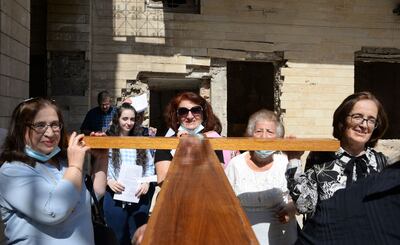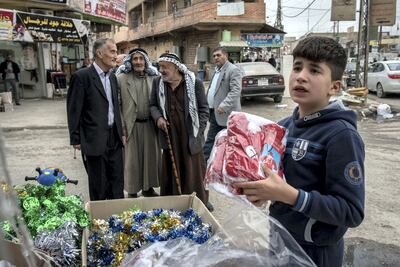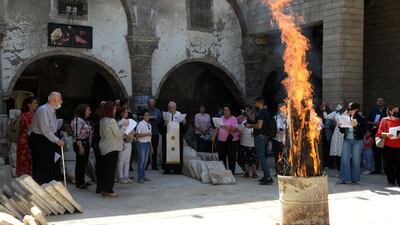In the spring of 2003, George W Bush invaded Iraq. The mayhem that an evangelical American president unleashed in the country could have been predicted. The ensuing occupation encouraged extremism, first with Al Qaeda, who had previously not had a presence in Iraq, then with ISIS.
As well as the Shiites, who were persecuted, both groups targeted the ancient Christian minorities, who have lived in the region for thousands of years. Under Saddam Hussein – who protected the Christians in exchange for their patronage – they were less vulnerable. Tariq Aziz, Saddam’s deputy prime minister, was a Christian. While the numbers within the Christian community have been dwindling throughout the 1990s, due to emigration, most Christians did not feel the acute risk they feel today.
I remember in the weeks before the 2003 invasion, attending a poignant mass at St Thomas Church in Mosul, built at the end of the eighth century. The Christian Iraqi worshippers were terrified and in tears even as they knelt and prayed. They foresaw life in their ancestral land disappearing forever.
Christians, like the many other minorities, make up the mosaic of modern Iraq. They are believed to be the oldest Christian community in the world; many of their ancestors can be traced to St Thomas and other apostles of Jesus Christ who came to witness and preach. Their roots are as sturdy as the mountain-top monasteries such as Mar Mattai, built in the fourth century near Mosul, where dozens of families sought refuge from the 2014 ISIS rampage.

These Assyrians, Chaldeans, Armenians, Melkites, Eastern Orthodox, Syriacs, Baptists, Latin Catholics and other sects are dying out. There are fears amongst religious scholars that in 100 years, these communities will vanish entirely. In Iraq, they have shrunk from an estimated 900,000 people to nearly half that number.
After the American occupation and the fall of Saddam, churches and Christians were cruelly targeted. Bombs ripped through the naves of churches. In a single attack in 2010, 50 people were killed. On Christmas Day in 2013, another 35. They were not killed because they were in the wrong place and the wrong time – they were killed because of their faith.
In 2014, the persecution took on a more deadly form in ISIS: with the intent to exterminate them. Starting with the city of Mosul, where the extremists overran one city and town after another, the Christians communities fell. ISIS gave the Christians of the region three choices: convert to Islam; pay a tribute, a jizya, to ISIS; or leave their city or town with nothing more than the clothes on their back.
The horror spread throughout the Nineveh Plains. The great churches in Qaraqosh, an Assyrian city, and other towns were burnt, bombed, crucifixes broken, artwork destroyed.

Their symbols of faith were trampled. The Tomb of Jonah, or Nabi Yunus, in Mosul, a site of devotion for Jews, Christians and Muslims, was levelled in July 2014. This was more than a random bombing. Sitting on a high mound containing an ancient Assyrian temple and a 12th-century mosque, the tomb stood for the interfaith.
For the first time since the seventh century, no church bells rang for mass in the Nineveh Plains. The letter “N” for Nazarene was painted above Christian doors. More than 120,000 people were displaced in the area, going from village to village. Many of them slept for weeks underneath the statue of Our Lady in Ein Kawa, a suburb of Erbil. Eventually, many of them ended up in displaced camps scattered in Kurdistan.
I spent three decades reporting in the Middle East and meeting with these communities and families. My book, The Vanishing: Faith, Loss and the Twilight of Christians in the Land of the Prophets, asks a grim question: will these people disappear in our lifetime? Their resilience and beliefs anchor them to their land. Yet, religious persecution, economics and climate change are forcing them to leave their roots. People from the Christian community, many who speak Amharic, the language of Jesus, are vanishing.

Each country I studied faced different challenges. In the Gaza Strip, a tiny population of 800 Christians – in the fourth century, Gaza was entirely Christian – survive in claustrophobic, extreme conditions, penned in by Hamas on one side and the Israeli occupation on the other.
In Egypt, persecution takes place at community rather than state level. Christian Copts face some persecution but they are not in the same category as high-risk countries for Christians such as Afghanistan or Iraq. The number of Syrian Christians, who largely gave their support to Bashar Al Assad, has dwindled after more than a decade-long brutal war.
With the fall of Afghanistan to the Taliban, radical groups throughout the region will be emboldened. There is still rage that the invasions of Iraq and Afghanistan – two Muslim countries – were Mr Bush’s modern crusade. Raised as an Episcopalian, now a devout Methodist, the former president makes no secret of his evangelicalism and his faith. He also believes in the existence of evil not as a philosophical notion but as a tangible, real threat.
After 9/11, the evil was Osama bin Laden and the solution was the global war on terrorism. I do not believe Mr Bush invaded Iraq in the name of religion (despite his unfortunate use of the word “crusade”) but the aftermath of his invasion has made the lives of his fellow Christian intolerable.
Today, seven years after ISIS initial rampage, Christian villages in Iraq are being rebuilt and people are returning. But they need help. What can we – Christians and non-Christians worldwide – do to support them?
One is to show solidarity. Pope Francis’s visit in March during Covid-19 sent a message: Christians are not alone in navigating an impossible future. Another is to restore economic stability so that members of the community can remain in Iraq by training youth, promoting industry and educating children. “Emigration is our enemy,” I was told repeatedly.
A third way might be in the form of concentrated efforts to battle climate change and environmental hardship. The UN cited Iraq as the fifth-most vulnerable country in the world to climate change-related factors. The agricultural sector in Nineveh was once Iraq’s breadbasket. It has been badly damaged by lack of water (ISIS even destroyed the sprinklers) and corrupt state mismanagement.
And yet, the Christian community has existed for 2,000 years, surviving genocides, purges, plagues and invasions. Their faith and strong sense of community has sustained them. During his visit to Mosul, Pope Francis told the embattled people: “The road to a full recovery may still be long, but I ask you, please, not to grow discouraged.”
What they needed most, the Pope added, was the ability to forgive but also the courage not to give up.
Janine di Giovanni is the author of The Vanishing: Faith, loss and the twilight of Christianity in the land of the prophets


